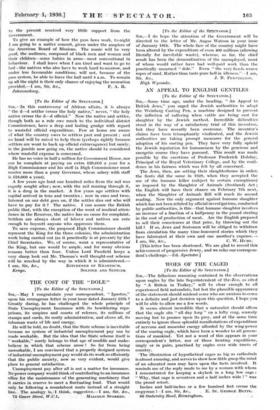[To the Editor of the SPECTATOR.] Sia,—In - this controversy of
African affairs, it is always " the d—d settler Versus the holy native," never, " the holy native versus the d—d official." Now the native and settler, though both as a rule owe much to the individual district Commissioner, have a deep and lasting grudge with regard to wasteful official expenditure. Few at home are aware of what the country owes to settlers past and present ; and no hand will be raised to help them (perhaps rightly because settlers are wont to back up official extravagance) but surely, in the -jumble now -going on, the native should be considered where wasteful expense is concerned.
He has no voice in half a million for Government House, nor can he complain at paying an extra no,000 a year for a High Commissioner and his staff (a High Commissioner must receive more than a puny Governor, whose salary with staff is £18,000 a year).
A few years ago land one hundred miles from the rail was eagerly sought after ; now, with- the rail running through it, it, is a drug in the market. A few years ago settlers with capital arrived in tens and twenties ; now in ones and twos. Interest on our debt goes on, if the settler dies out who will have to pay for it ? The native. I can assure the British public that, with the exception of the want of medical atten- dance in the Reserves, the native has no cause for complaint. Settlers are always short of labour and natives are cute enough to boycott anyone who oppresses them.
To save expense, the proposed High Commissioner should represent the King for the three colonies, the administration work being carried out (as it practically is at present) by the Chief Secretaries. We, of course, want a representative of the King, but one would be ample, and for many obvious reasons better than four. Unless Lord Passfield keeps a very sharp look out Mr. Thomas's well thought-out scheme will be wrecked by the way in which it is administered.— I am, Sir, &c., KITCHENER OF KHARTOUM, Kenya. SOLDMR AND SETTLER






































 Previous page
Previous page